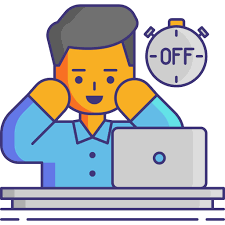Stressed? Try the Shut Down Routine.
No, I'm not saying shut yourself off when you're stressed about unfinished business. I'm saying that you should follow an algorithm to offload your stress.
Let's step back for a bit. Right now is a special time of the year for many teachers while others have already settled in. Normally, I wouldn't feel stressed out because I am given many days to prepare my classroom. However, the school I teach is currently under construction and is getting its last finishing touches. So, this kind of postponed a lot of things, making me feel like I'm doing things last minute.
Luckily, I heeded one of the pieces of advice I gave in an article I wrote last summer, which basically suggested that teachers should be preparing lessons in the summer. Not only did I do that, but I did a year's worth of lessons in advance. This took like 40% of the stress off of what I would have otherwise found to be an impossible situation to be in.
Though I have less to worry about, it feels like I'm not giving myself permission to not worry. This is a weird feeling we all get at work, and it messes up our work-life balance because we stay a little extra at work to make sure there are no loose-ends. But what if we're not tying loose ends? What if it's just perfectionism with diminished returns? This is called the "Zeigarnik effect".
A while ago, as I was reading Cal Newport's Deep Work book, this effect was brought up.
This effect [...] describes the ability of incomplete tasks to dominate our attention. It tells us that if you simply stop whatever you are doing at five p.m. and declare, “I’m done with work until tomorrow,” you’ll likely struggle to keep your mind clear of professional issues, as the many obligations left unresolved in your mind will [...] keep battling for your attention throughout the evening (a battle that they’ll often win).

In response to this, Newport introduces the concept of a "shutdown routine" – a systematic way to close the day, ensuring no task is left unattended without feeling guilty about not finishing to completion. This routine entails:
- Reviewing To-Do Lists and Calendars: Ensure all tasks are attended to or rescheduled if unable to be completed now.
- Planning for the Next Day: An outline of what’s on the plate for tomorrow.
- Tidying Up: A physical and digital declutter.
- A Set Mantra: Something like "shutdown complete" to mentally affirm that work is over.
- Complete Disconnection: No work emails or tasks after this.
If something bothers you after this routine, it can then be dismissed as noise as you remind yourself that you already said "shutdown complete". Additionally, since you can't control it any other way BECAUSE you already went through reflecting on what you COULD do, there's no better reason than to let it run its course so long as you follow-up on it during your dedicated scheduled time.
This ritual, according to Newport, helps in drawing a clear boundary between work and personal time, ensuring that your mind truly gets to rest after work.
Perhaps, by adopting such a routine, we can find that much-needed balance and grant ourselves the permission to truly disconnect, without the nagging feeling of unfinished business. After all, if I am prepping my plans months in advance, why not prep my mind to relax too?

✍️ Quote of the Week
Life isn’t any fun without a sense of enough. Happiness, as it’s said, is just results minus expectations.
From The Psychology of Money: Timeless Lessons on Wealth, Greed, and Happiness by Morgan Housel. Resurfaced using Readwise.



Member discussion